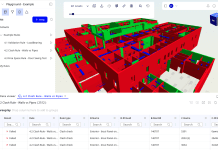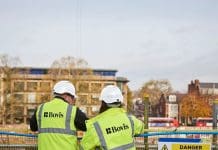In an age where it’s increasingly obvious that technology is one of the main drivers for a successful construction industry, it’s perhaps easy to feel overwhelmed by the need to adopt advancements in our day-to-day business. From laser scanning to drones, wearable tech to Big Data and IoT and incorporating BIM into ‘business as usual’, how do we digitise our built environment industry and embrace the advancements on offer?
The first step must be a willingness to learn and understand how these advancements can impact an organisation, and regarding BIM, there are a growing number of successful projects where the global BIM ethos has been applied with vast benefits.
The UK government mandate requiring all centrally procured public sector projects to be implemented using BIM Level 2 has been a driving force for wider industry adoption in the UK and is widely seen as an exemplar for BIM progression globally. British Standards and the PAS 1192 suite of documents have established a framework for collaborative working and information requirements to follow to achieve the elusive BIM Level 2 ‘holy grail’. But, the processes and technologies that support BIM are constantly changing, presenting more challenges; namely, how do we educate the industry and equip it with the skills they need?
The skills challenge is a global one, and with differing terminology, standards and requirements across regions, the challenge to deliver expert, smart BIM training to educate both large and small global organisations to achieve standardisation on digital construction on a universal scale is paramount.
Digital Node began as an evolved idea in 2013 as a reaction to the growing need to plug this gap in the global BIM environment; namely providing education, training and consultancy services to ensure businesses are meeting the demands of a digital built environment.
While the use of UK standards supporting BIM Level 2, such as the PAS 1192 suite, are now used throughout Europe, Asia and Australia, the creation of the international standard ISO 19650 presents another set of challenges. It’s probable that some regions, through differing uses of terminology, will need to use the standard in alternate ways with additional annexes.
This level of understanding and analyses of regional requirements has been the motivation behind Digital Node’s activities globally. From the BIM Management and BIM Technician courses they’ve delivered to the CIOB, to the training delivered for BSI China, they are now a global operation and work with many clients spanning multiple continents. One such client is the Global eTraining (GeT) organisation, who, over the past seven years has sold over a million courses to learners in 150 countries.
Digital Node’s relationship with GeT began in London in 2014 when Rebecca De Cicco, Director of Digital Node was introduced to Susan Brattberg, their Founder and Chief Customer Officer while they were visiting the UK to promote their training material. An immediate strong relationship was formed through their mutual desire to inform and educate industry, and they began to work together in earnest. Having two very reputable global training providers coming together to deliver expertise, skills, and insight, resulted in a unique offering regarding BIM training.
GeT were one of the first strategic relationships Digital Node formed, and they continue to work with the company to develop online training content including some of the following courses:
- Autodesk Navisworks
- Autodesk Recap
- Autodesk Infraworks
- Global BIM Standards library (selling now)
- Autodesk BIM 360 Solutions.
The courses that Digital Node helps to develop have been sold globally, and most recently, they supported GeT in the development of an online Global BIM Standards Library focusing on best practice principles in BIM and an understanding of the terminology, methods and standards used.
The combination of experience enables GeT and Digital Node to deliver essential, informative and crucial training for the construction industry worldwide. Susan recently commented that:
“Global eTraining is proud to collaborate with Digital Node and to support AEC firms from around the world in their BIM training initiatives. The courses we have sold so far, and the courses we are developing now are imperative if we are to grasp the opportunities offered by a digital built environment.”
Looking forward to their future activities, Rebecca De Cicco added:
“We will continue to help develop content for Global eTraining in many technology platforms supporting the BIM process including Autodesk Navisworks and Infraworks, and in the New Year we will be helping to develop new ReCap and BIM 360 courses.”
Delivering the necessary skills to a global audience is critical if we are also to address the confusion that often arises from roles and role requirements not clearly defined by standards. Organisations need an understanding of what each role can deliver in a project or team which are clearly documented as part of a BIM implementation programme.
Individuals and organisations who see the benefits of expert high-quality training and knowledge acquisition can incorporate BIM in future projects. With appropriate training and education it’s possible to understand what is required from a myriad of viewpoints; from what a BIM execution plan should involve to applying tools, techniques, technologies, collaboration, data, processes and standards within the global BIM environment.
The BIM skills and knowledge delivered by Digital Node are a crucial element to an organisation’s growth and ultimate success in this demanding digital arena. Only by being BIM-enabled is it possible to future-proof an organisation. So, the question that organisations need to answer is just how much they value their existence in a digitised industry.














